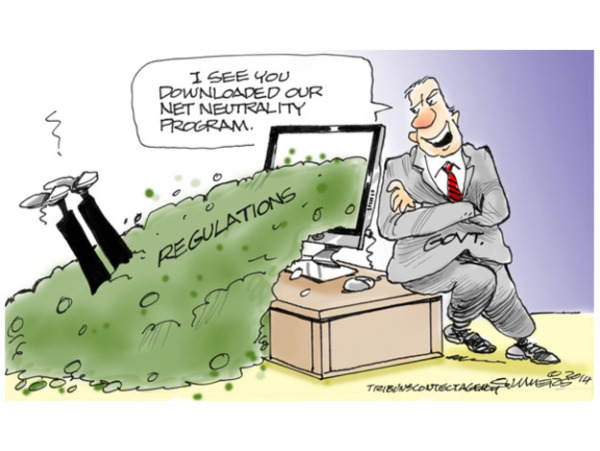I suspect that most Americans, if asked to list the biggest economic success story in the United States over the past few decades, would list high tech and the Internet.
And that would be a good answer. For those of us with a good bit of gray hair, it’s sometimes remarkable to think how much different the world is today with laptops, tablets, smart phones, and all sorts of other gadgets.
Gadgets with huge value, by the way. Ask yourself the question in this video. How much money would you need to give up the Internet for the rest of your life?
But if every dark cloud has a silver lining, then I guess silver clouds must have dark linings. And you won’t be surprised to learn that the dark lining for the Internet and high tech is big government.
More specifically, the Federal Communications Commission (FCC) wants to use a law from the 1930s as an excuse to seize authority to micro-manage this (at least so far) vibrant sector of our economy.
In a column for the Wall Street Journal, Gordon Crovitz writes about this regulatory power grab in Washington that could stifle the “permissionless innovation” of the Internet.
Last week Washington abandoned open innovation when the chairman of the Federal Communications Commission yielded to President Obama ’s demands and moved to regulate the freewheeling Internet under the same laws that applied to the Ma Bell monopoly.
So what does that mean?
Until now, anyone could launch new websites, apps and mobile devices without having to lobby a regulator for permission. That was thanks to a Clinton-era bipartisan consensus that the Internet shouldn’t be treated as a public utility. Congress and the White House under both parties kept the FCC from applying the hoary regulations that micromanaged the phone system, which would have frozen innovation online. Last week’s announcement from FCC Chairman Tom Wheeler rejects 20 years of open innovation by submitting the Internet to Title II of the Communications Act of 1934. Once Mr. Wheeler and the commission’s Democratic majority vote this month to apply Title II, the regulations will give them staggering control. Any Internet “charges” and “practices” that the bureaucrats find “unjust or unreasonable is declared to be unlawful.”
And it will open the door to cronyism as already-established companies and well-connected insiders work the system for their own advantage.
This is an open invitation to entrenched companies challenged by new technologies. The Internet has been a source of creative destruction, upending industries from music, movies and newspapers to retail, travel and banking. History teaches that companies threatened by competition will hire as many lawyers as necessary to get regulators to protect them.
And when I wrote the door will be open, it will be wide open.
In 2005, the U.S. Supreme Court warned that if the FCC treated the Internet as a telecommunications service, it “would subject to mandatory common carrier regulation all information service providers that use telecommunications as an input to provide information service to the public”—in other words, almost all websites and apps would be subject to regulation. …once regulators get power, they use it. And if there is any forbearance, there will be litigation from companies seeking to burden their competitors with regulation.
Here are some videos that help put the debate in context.
Let’s start with this Reason TV interview.
Next we have a humorous portrayal of Internet usage in a bureaucrat-governed world.
Sort of reminds me of this Obamacare OB/GYN video.
Last but not least, here’s a dry but very informative explanation of the “net neutrality” issue.
But perhaps all you need is this cartoon, which is from a bigger collection that can be enjoyed here.

Think about the big picture. Is there a sector of the economy that has become more efficient and inexpensive because of government?
Health care? Nope.
Higher education? Nope.
Banking? Nope.
Charity? Nope.
Manufacturing? Nope.
I could continue, but you get the idea.
